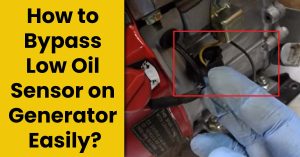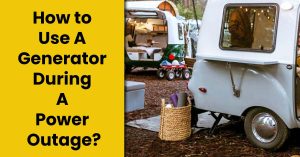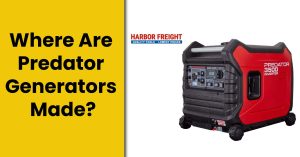How To Make A Generator Quieter? – 10 Pro Tips
We all have an idea about the importance of generators in our lives. It is almost impossible to make life better without generators in stormy weather. Due to heavy rainfall, storms, hurricanes, or other weather conditions, power outbreak is the most common thing that happens in every area.
So, it becomes necessary to have a generator to tackle such extreme circumstances, especially when there are children at your home.
The biggest problem that results due to the usage of generators is noise pollution. They produce heavy noise and it certainly seems difficult to avoid those noises.
Though they are capable of providing enormous joy to the life of users but the heavy noise sometimes becomes unbearable.
In this article, we will share some of the most effective methods you can try to make your generator less noisy or quieter at all.
So, read it carefully and follow these methods if you have a question in your mind like how to make a generator quieter.
How Loud Is Your Generator?
If you want to find out the frequency of sound your generator produces then check out some of the decibel meters that we have mentioned below.
You can also use your smartphone for this job.
Most portable RV generators have noise level that ranges from 60 to 70 decibels.
If your generator isn’t built to be quiet or has some mechanical or maintenance issues then the frequency of noise can range from 85 to 90 decibels. And it is a fact that this noise range is intolerable.
A sound that ranges more than 90 decibels can be damaging to the human ear.
Below is the noise level chart
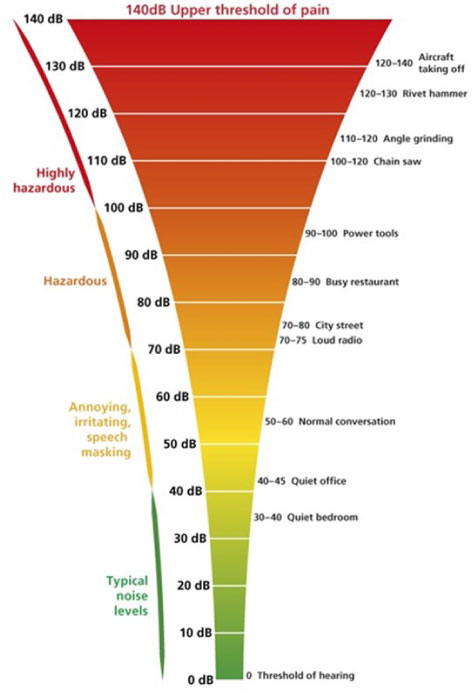
Also, we have listed some of the best quiet generators available in the market make sure to have a look if you want the one
Why Generators Are So Noisy
Before starting a process to make your generator quieter, it is important to know the reasons for the generator being noisy.
There are a number of factors that play a role in making your generators noisy.
Power Generation:
It is obvious that a generator with a more powerful engine and wattage will produce more noise. While in reverse, a light engine and a less powerful generator will produce the least noise.
So, it all depends on the power of the engine.
I’d suggest using a generator of not more than 4000 watts if you want to avoid heavy noises.
Generator Usage:
The usage of the generator also decides the frequency of sound it will produce. The setup you have arranged and the surroundings of your generator will also affect the noise.
If you make the arrangements in the right position the noise will be affected in a positive way. You can also try soundproofing methods.
Technology With Which It Is Built:
The technology of the generator also matters a lot in the extent of noise it produces.
A traditional unit of generator will produce more noise as compared to the advanced quiet inverter technology.
Modern generators use high-end electronics, noise-reducing shells, and specialized magnets. They are well-known for their silence as well as the stable flow of power.
The most competitive brands have made customers lucky by delivering top-end features at some of the best prices.
They are very compact in design, highly reliable, soundproof design, and provide additional mufflers.
But as they produce less noise but few advanced models do not have the comparable capacity to generate a larger amount of power as compared to the traditional models.
Engine Fuel:
As generators work on different types of fuels, the usage of each fuel will reflect the different impacts on noise production.
As we have already mentioned that diesel-powered generators are the loudest units.
While solar or gas-powered generators are a bit quieter. However, solar or propane-powered generators are very environmentally friendly but come with heavy price tags.
Checkout our guide about propane vs gas generators to get an idea about which of the technology is efficient.
How To Make A Generator Quieter?
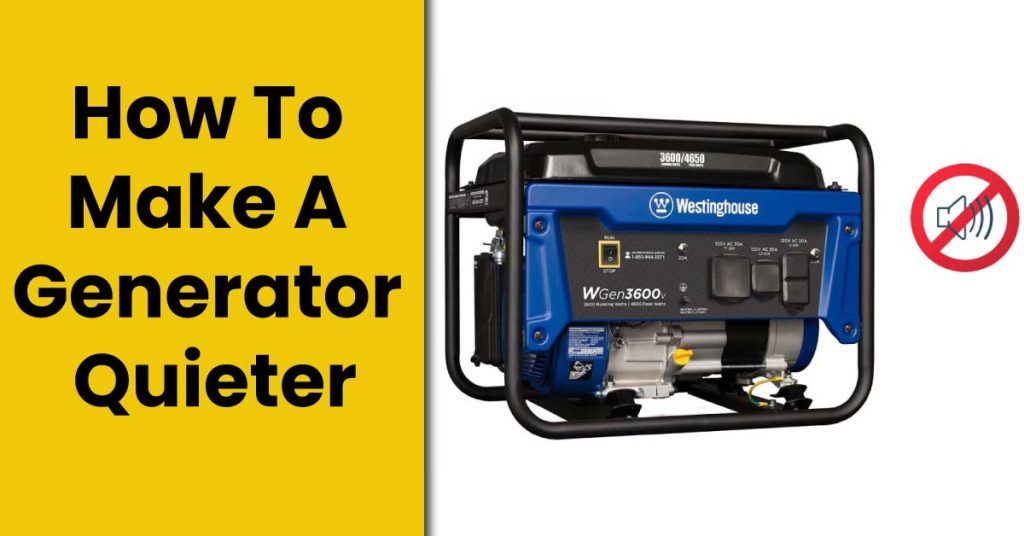
When you plan to quiet your generator, it aids in maintaining the peace at your home in emergency situations.
While it will also reduce the stress on your neighbors from being bothered by the loud-noise generators.
A generator is the best companion in case of emergency but if you are using it for a long time without silencing it then it can be a great problem for you.
Whether you are using your generator at camping, any person around you will never want to have a restless night due to your noisy generator.
Below we have elaborated on different methods you try to adopt for making your generator quieter:
#1. Purchase A Generator That Fits Your Needs:
Your needs for power matter a lot when you make mind to purchase a generator. If you have an idea about your power needs before buying, then you should avoid the noisy generator situation as a whole.
As it is a simple fact that the more power your generator can put out, the more noise it is going to produce.
It is important to weigh the amount of power you’ll need, the frequency of noise bearable for you, and how much you are willing to spend on a generator.
Usually, people at camping use generators to charge their smartphones, tablets, and other electronic devices that do not require much power.
To recharge these smaller devices, a less powerful generator will be fine. A generator supporting a few hundred watts of power can easily handle tasks like this.
In order to charge large and more powerful devices such as your camper’s microwave, refrigerator, or A/C unit, a generator with higher wattage output will be ideal for you.
To provide power to these appliances a generator with 2,000 to 5,000 watts output will be preferable.
There are some generators available in the market that can deliver both benefits of high power and the least noise. But as the matter of fact, these generators are very expensive.
Checkout our guide about inverter vs conventional generators to get an idea about which of the technology quite
#2. Move Your Generator Further Away:
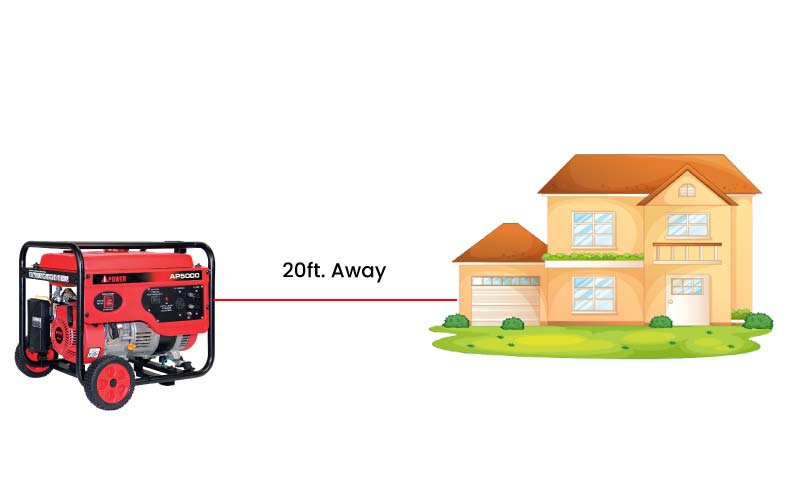
At first, it may seem convenient to place your generator at a nearby place, but with the passage of time, you will realize that placing a generator at a nearby place is the biggest mistake you’ve made.
As the generators are very loud, it becomes hard to bear those loud noises for a longer period.
It is highly recommended to place a generator as much far as possible. You should place it at least as far as 20 feet away from your sitting.
If you go with some branded generators in order to find quiet ones with 60 decibels or less but it will be mentioned 7m in a sense the sound reading is taken at that distance.
It is not an exaggerated calculation. But you should keep as much distance as possible to maintain a peaceful environment at your place.
There are generators that claim to be quieter are less noisy as compared to the generators that do not mention this. Or the generators claiming the frequency of sound around 60 decibels will be quiet only if they are placed 7m away from you.
#3. Place The Generator On A Soft Surface:
It has always been advised to place a generator on a concrete pad. You can check the requirements and recommendations by the manufacturer for the placement of your generator.
For placing generators in softer places, you can use some rubber pads or mats that are specifically designed for it.
Rubber pads and mats are very effective in acting as sound absorbers. All the loud noises and vibrations will be absorbed by the use of those rubber mats.
#4. Point The Pipes Away From The House:
If for some reason, you are unable to move your generator far from home, you can try an easy trick suggested by professionals.
This trick will work on the exhaust pipe of the generator which is often the main source of the noise.
To resolve the problem, you can turn the exhaust pipe in the opposite direction of your home. The sound waves traveling from the generator to the pipe will not transfer to your home.
It may seem a bit rifle but it is quantitatively very effective in reducing the noise levels.
#5. Create Sound Deflectors:
To reduce the level of sound, you can also use sound deflectors. It sounds a bit technical but the method is very simple and easy.
To do this job, you are going to need four sheets of plywood and a sheet that is made of non-flammable material.
Drywall is one of the good materials to be used as it is resistant to fire. The sizing should be around 4 feet wide and 3 feet in length.
Use a drywall sheet for that side of the generator that houses the exhaust. You may not want your deflectors to catch fire.
In this way, the pieces of wood you placed around the generator at a particular angle leave room for the flow of air while it will deflect the sound waves in the direction of the earth.
This whole method will lower the decibels your generator is putting out without inflicting the performance in a negative way.
#6. Add Or Replace The Muffler:

Some of the generators already have a muffler and some do not have. If the muffler is already present all you have to do is to replace it with the new one.
In case, there is no muffler, you may get and install one.
This will be a bit complicated for you but with some research, you will do it on your own.
#7. Use Water As A Muffler
Using water as a muffler is also known as a water bucket trick. A water bucket of 5-gallon, a garden hose, and a clamp will be needed to hold the exhaust pipe of your generator.
You have to place the bucket lower to the generator so there’ll be the need for that adjustment.
Connect the hose to the exhaust pipe with the help of a clamp. The other end of the hose will be inside the water bucket.
As the exhaust ends up inside water and is muffled by it, instead of muffling into the air to produce noise.
The frequency of sound can be reduced to around 5 to 7 decibels by using this trick.
#8. Tighten The Loose Parts:
People do not bother to pay attention to this part as they think it doesn’t produce much sound. But in reality, it does.
Vibrational noise can be heard easily if some of the parts of the generator are loosely attached and this sound will be additional noise.
Some screws and bolts will be loosely attached or may become loose over time of usage.
So, it’d be better to check the whole generator and tighten all the loose parts if there are any.
Following this method will not cost you even a penny and the problem you are facing right now will also be resolved.
#9. Lubricate The Bearings:
In order to free the rotation, there are bearings present in the generator. But after a period, those bearings become noisy and lose power if not lubricated properly.
This can also result in wearing and tearing of the different parts of the machine, in this case, your generator.
So, it is highly recommended to lubricate the bearings once in a whole by applying grease on contacting surfaces or the moving parts.
Note: Sometimes, if you apply excess grease then it can adversely affect your generator.
The bearings get choked and it becomes very hard to move them. So, it is highly recommended to use the only needed amount of grease.
#10. Build An Enclosure:
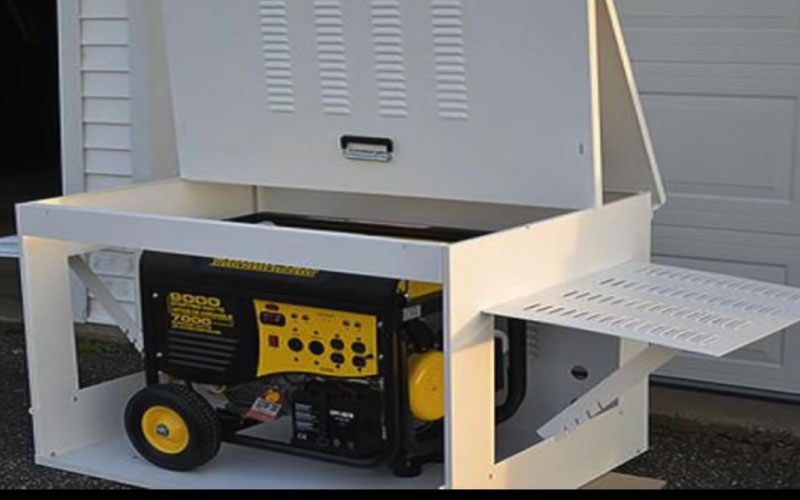
Last but not least, this method is to make a generator quieter by building an enclosure.
This works the same on the principle of deflectors but you will need to do a bit more work.
It is just like building a little sound studio for your generator that will always keep the racket in. For this purpose, you will need the following things:
You can follow this article: How to build a generator’s silencer? to build your enclosure.
Here Is the video about How To Make A Generator Quieter from the soundproof guide:
Conclusion
The tricks of making your generator quieter are simple as well as complicated as you want to make them.
Regardless of whatever method you choose to do this job, all the above-mentioned tips are highly effective.
We are pretty confident that you don’t have to raise the question about How To Make A Generator Quieter. if yes please leave a comment.
You can also go to buy the quietest generators available in the market, as most of them are inverter generators.
But it is also true that these types of generators are pricier as compared to conventional portable generators.

Josh is a highly skilled electrician with specialized expertise in the field of generators. With years of experience under his belt, he has established himself as an expert in all aspects of generators, ranging from installation and maintenance to troubleshooting and repairs. Josh’s in-depth knowledge of electrical systems and his commitment to staying updated with the latest industry advancements make him a reliable and sought-after professional.

